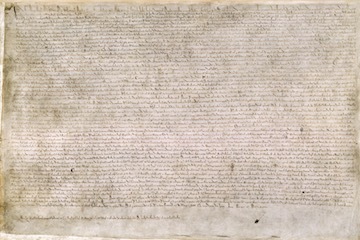On The Magna Carta

The Magna Carta (Latin for the Great Charter) is a peace treaty “agreed” (at knife point) by King John of England and his barons. The charter came about after a group of barons rebelled against the King over taxation. It was signed in Runnymede on the banks of the river Thames, between Windsor and Staines. It was written by the then Archbishop of Canterbury. It ensured protection of church rights, it disallowed the imprisonment of the barons without a fair trial, swift justice and put a limitation on feudal payments to the Crown.
That same year Pope Innocent III annulled the charter, neither side had stuck to it anyway, resulting in the First Barons’ War.The Pope explained that the barons had “by such violence and fear as might affect the most courageous of men” forced the king to agree to a treaty that was ‘illegal, unjust, harmful to royal rights and shameful to the English people’.
After King John’s death his son King Henry III under the regency of William Marshall (“best knight that ever lived&rdquo
Even though the Magna Carta has been the basis for much of our democratic system and the freedoms that we take for granted today, in not just England but much of the western world, only three clauses out of sixty-three in the charter are still used on the statute of England and Wales today. The freedom of the Church of England, the ‘ancient liberties’ of the City of London and the right to due legal process.
“No free man shall be seized or imprisoned, or stripped of his rights or possessions, or outlawed or exiled, or deprived of his standing in any other way, nor will we proceed with force against him, or send others to do so, except by the lawful judgment of his equals or by the law of the land.”
Its legacy 800 years later lives on not just in English law but in much of the legal and democratic processes of the civilised world. Also, its influence can be seen in the United States Bill of Rights (1789) and the Universal Declaration of Human Rights that was written up after the second world war.
My crown was passed to me by my brother, and my father before him. I was born to be a king! It is my birthright! Given to me by God! You cry for the common man and in the same breath you curse the crown that protects him! You dare to question my reign... and the lineage of Kings who have reigned before me?! The great amaranthine royalty of Aquitaine... ..who forged this land from barbarian hordes and made it noble and pure! Who gave it order, meaning, and even faith... to thousands of years of loyal subjects! And it is all now questioned by you! And we are forced to sign your precious Magna Carta, forced by you, a wool merchant! I am the blood! I am God's right hand! And you will never dictate to me how I am to be a king!
- Paul Giamatti as King John in Ironclad (2011)
Magna Carta Wikipedia Page: Link

